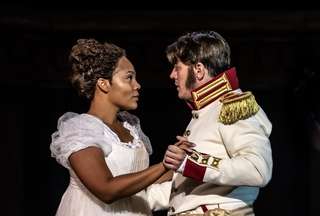|
Back
A bold season opener Cardiff
Wales Millennium Centre
09/15/2018 - & September 22*, 29 (Cardiff), October 13 (Oxford), 20 (Llandudno), November 17 (Birmingham), 24 (Southampton), 2018
Sergei Prokofiev: War and Peace, opus 91
Jonathan McGovern (Andrei), Lauren Michelle (Natasha), Mark Le Brocq (Pierre), Jurgita Adamonytė (Hélène), Adrian Dwyer (Anatole), Leah-Marian Jones (Princess Marya), James Platt (Count Rostov), Jonathan May (Old Prince Bolkonsky), Donald Thompson (Jacquot), David Stout (Napoleon), Simon Bailey (Balaga, Field Marshal Kutusov), Samantha Price (Sonya), Julian Boyce (Servant, Dr. Metivier), Carolyn Jackson (Housemaid, Vasilisa), Laurence Cole (Gavrila, Matveyev), George Newton-Fitzgerald (Joseph), Sarah Pope (Matriosha), Joe Roche (Abbé), Rhodri Prys Jones (Fyodor, Ivanov), Gareth Dafydd Morris (Karatayev), Owen Webb (Orderly, Gerard), Paula Greenwood (Shopkeeper)
The Welsh National Chorus, Stephen Harris (chorus master), The Welsh National Orchestra, Tomás Hanus (conductor)
David Pountney (director), Robert Innes Hopkins (set designer), Marie-Jeanne Lecca (costume designer), Malcolm Rippeth (lighting designer), David Haneke (video projection designer), Denni Sayers (assistant director/choreographer) 
L. Michelle & J. McGovern (© Clive Barda)
The Welsh National Opera’s production of War and Peace is a terrific success, thanks largely due to director David Pountney’s ability to bring forward the salient points of each of the 13 scenes while vividly characterizing each role. At times this edges into caricature (as with the portrayals in Part II of the German generals and the French aides-de-camp), but one is always able to follow the intertwined dramatic threads.
Another device that helps us keep track of the dozens of characters (and one I’ve never seen before) is including the name of the character singing in the projected titles, a terrific aid in the crowded ballroom and battle scenes.
The scenic design makes use of stills and actions sequences from Sergei Bondarchuk’s epic film made in the 1960s. This serves to amplify the cinematic sweep required to carry an audience through the work’s four-hour length.
The performance begins in a sly way. With the house lights still on, we see a white-bearded man sit at a desk and begin to write. This is obviously meant to be the elderly Tolstoy (although he wrote War and Peace while in his late thirties). Cast members saunter on, one-by-one - and then suddenly the house lights do out and the chorus and orchestra launch the vehement epigraph declaring Russian solidarity in the face of threats.
Part I (Peace) is dominated by a yearning theme that dips and soars while it evokes springtime and love, specifically that of Andrei for Natasha. It reappears in Part II when Andrei reflects on their failed engagement. Part II (War) also has a dominant musical theme, one that plunges and rises with resolute impetus, expressed most vividly by Marshal Kutusov in his paean to Moscow. Part I focuses on a romance that goes awry. Part II can become a heavy going patriotic pageant, but the two scenes where Pierre and then Andrei come face-to-face with death rise to an astonishing height of eloquence.
Astute casting is another major element of the production. The love triangle focuses on the Natasha of Lauren Michelle who is a total delight in every way. Mark Le Brocq as the upright but socially awkward Pierre who finds himself married to a most unsuitable wife is splendid in what turns out to be the sprawling work’s central role. Jonathan McGovern is an appealing Andrei. The fourth major role is that of the one-eyed Field Marshal Kutuzov to which Simon Bailey brings a shambling swagger and pugnacious delivery.
Many smaller roles stand out as well, for example Gareth Dafydd Morris as Platon Karatayev, Adrian Dwyer as the louche Anatole (one of his seven roles), David Stout as Napoleon...
The work was sung in English and the translation worked much better than I expected. There were just a few awkward moments (and there might be just as many in the original). The English titles could be a distraction, especially when a singer was especially adept in projecting the words. James Platt wins the prize for this; he sang five roles, notably that of Count Rostov, Natasha’s father, an aristocrat whose bluff demeanor attracts the ire of his daughter’s future father-in-law, the irascible old Prince Bolkonsky (memorably performed by Jonathan May).
Holding it all together is WNO’s Music Director Tomás Hanus. The company’s musical standards seem to be in good hands.
Just one brief scene failed to rise to the overall terrific effect: toward the end four dancers brandishing rifles do a quasi-military number à la The Red Detachment of Women. Part II contains elements of a patriotic pageant, but this bit of agitprop kitsch was jarring. (Maybe it was meant to be funny?)
In addition to the three performances in Cardiff, this production goes on the road for a single performance in each of four cities (the production will also be shared with Magdeburg). I note that all performances are on a Saturday, a wise policy. The opera makes quite a time demand on its audience – in this case, well-rewarded.
Michael Johnson
|